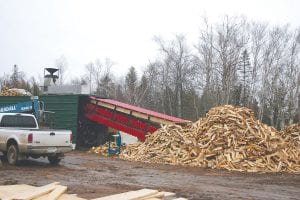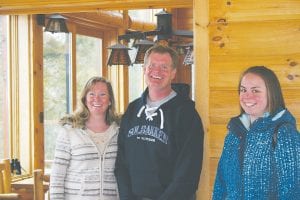Angelique Edgerton of the Cook County Invasive Species Team gave a presentation at the Sugarloaf Cove Nature Center on the gypsy moth and the steps being taken to control its spread westward. Although there are a number of measures that can be followed to potentially slow the spread and control the insects, extreme heat is one “sure-fire” way of insuring their demise.
Enter the husband and wife team of Shawn and Dave Howe of North Shore Timber Products and Services LLC. Originally from Ontario, they have more recently spent 11 years operating a dairy farm in South Dakota before purchasing the Solbakken Resort and Spruce Creek Cabins near Lutsen. Partway through the first winter here they heard of a neighbor that had ran out of firewood and only had green wood left to burn. Add to that the impending quarantine due to the gypsy moth and the idea of kiln-dried firewood was born. It also seemed a logical business to pursue during the slower winter tourist season.
They purchased the kiln in January and were up and running near the end of February. They are currently awaiting certification from the United States Department of Agriculture (USDA), which would allow for their firewood to be transported beyond the quarantine boundaries
The USDA requires that the wood reach 140 degrees for a period of four hours to receive certification. Certain other states require a minimum of 160 degrees. The Howes heat their wood to 160 degrees for a period of 30 hours in order to exceed all minimum requirements nationwide. Six probes inserted into wood in the kiln measure the temperature and report every five minutes to a computer located in a nearby trailer.
Fresh wood, which can be 70 percent moisture or more, naturally dries to about 45 percent in one year and can take two to three years to dry to the 20 percent point that the kiln can accomplish in 48 hours. Burning wood that is not properly dried can cause creosote build-up that can then ignite and cause chimney fires.
The kiln, which processes six cords of wood at a time, is capable of running 24 hours a day and could be run year round if the demand merited it. Twenty percent of the processed wood is fed back into the firebox as needed through the use of an auto-feeder. The firebox maintains a constant temperature of 1,000 to 1,500 degrees. “We can provide on-demand firewood anytime we need,” says Dave.
There are other kilns in Minnesota but many of them are not in close proximity to a wood source and require importing green logs to dry. Being in a heavily forested area such as Cook County, the Howes have the advantage of having wood that can be supplied by local loggers.
Once the kiln-dried wood is split, it is bundled and is then ready to be shipped or sold. The Howes hope to develop a market that will allow them to export most of their finished product out of the area
In addition to their firewood kiln, the Howes hope to soon purchase another kiln for use in the production of North Shore furniture that they will feature in the resort and eventually offer for sale. They also employ an arborist who assists them in offering pruning and tree cutting services for local property owners.
Per Dave Howe, “Forest stewardship is where it’s at!”




Loading Comments